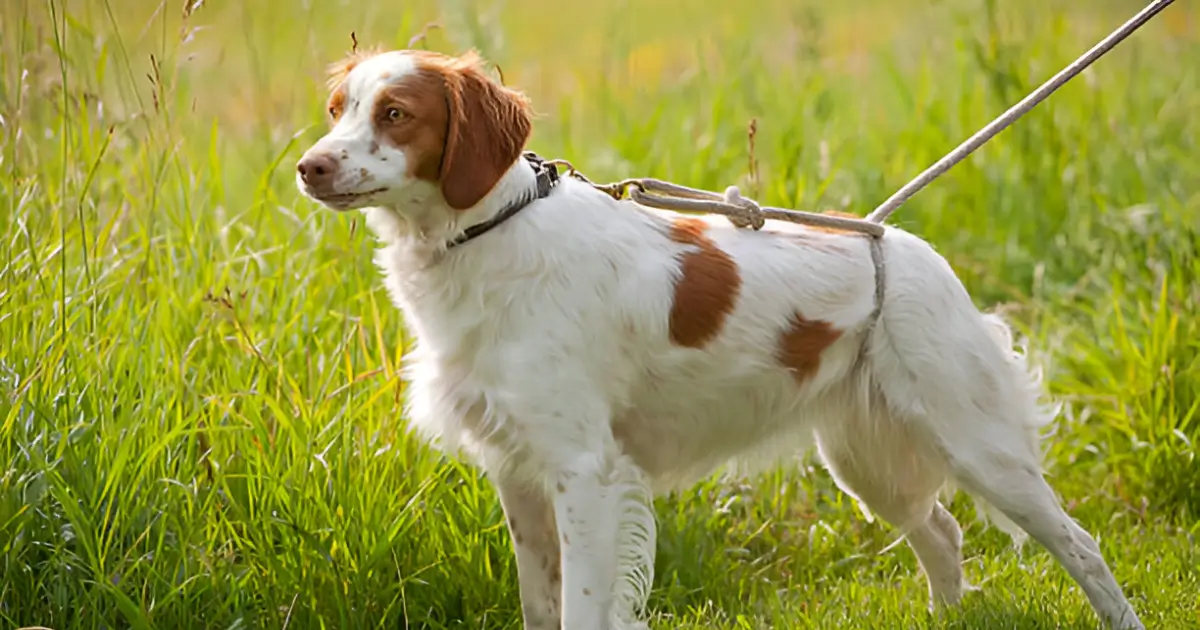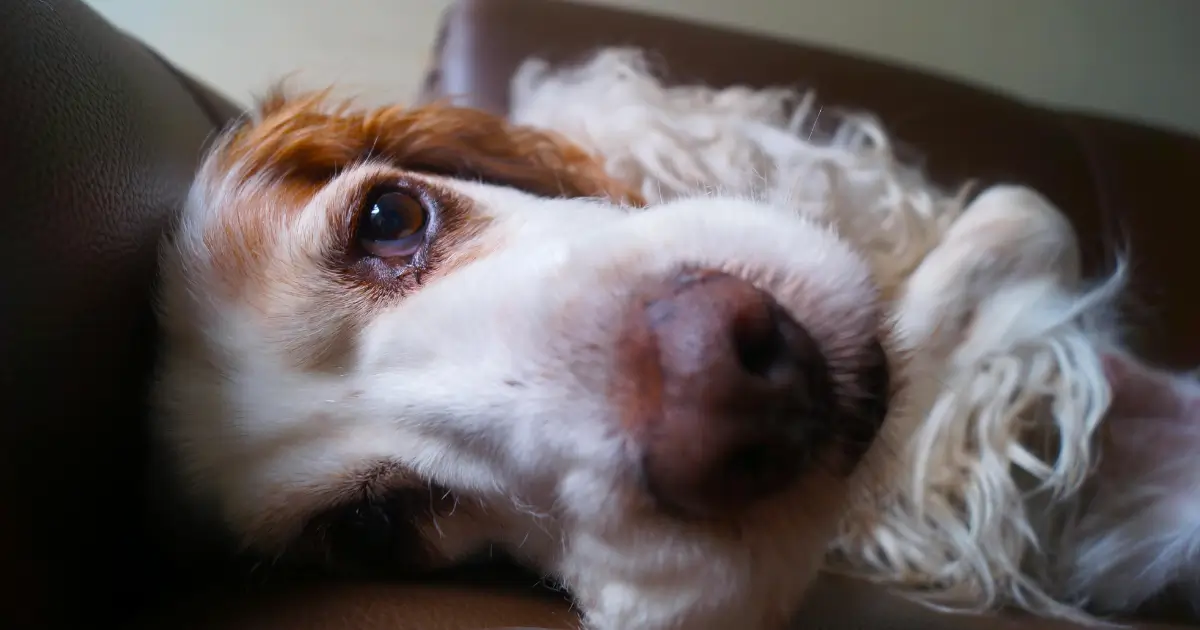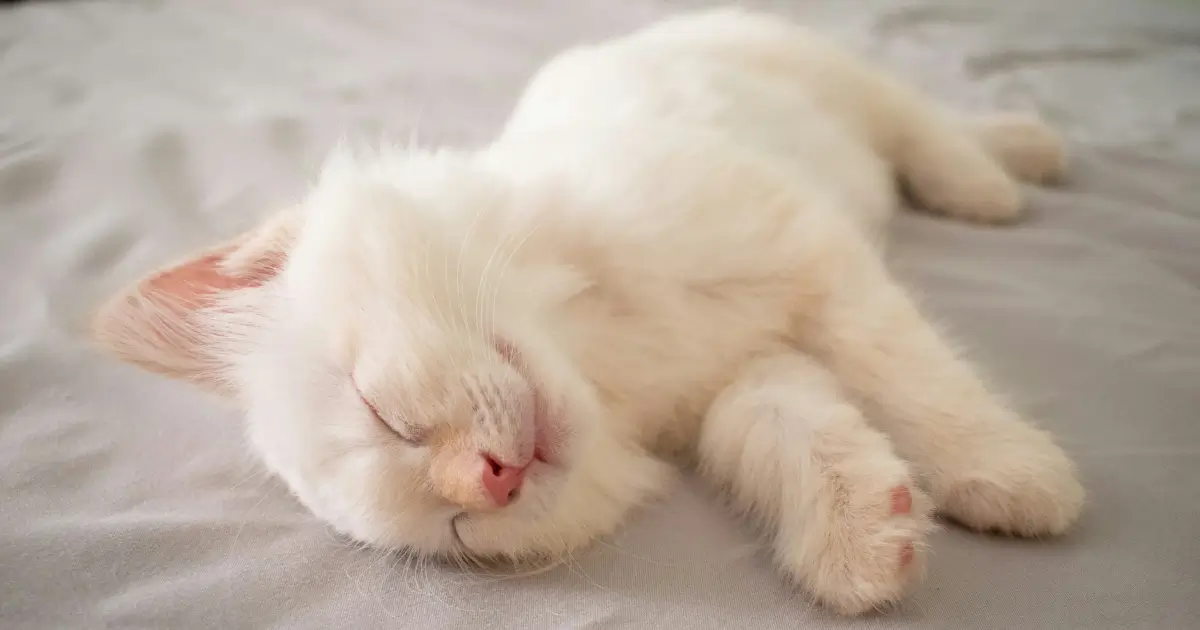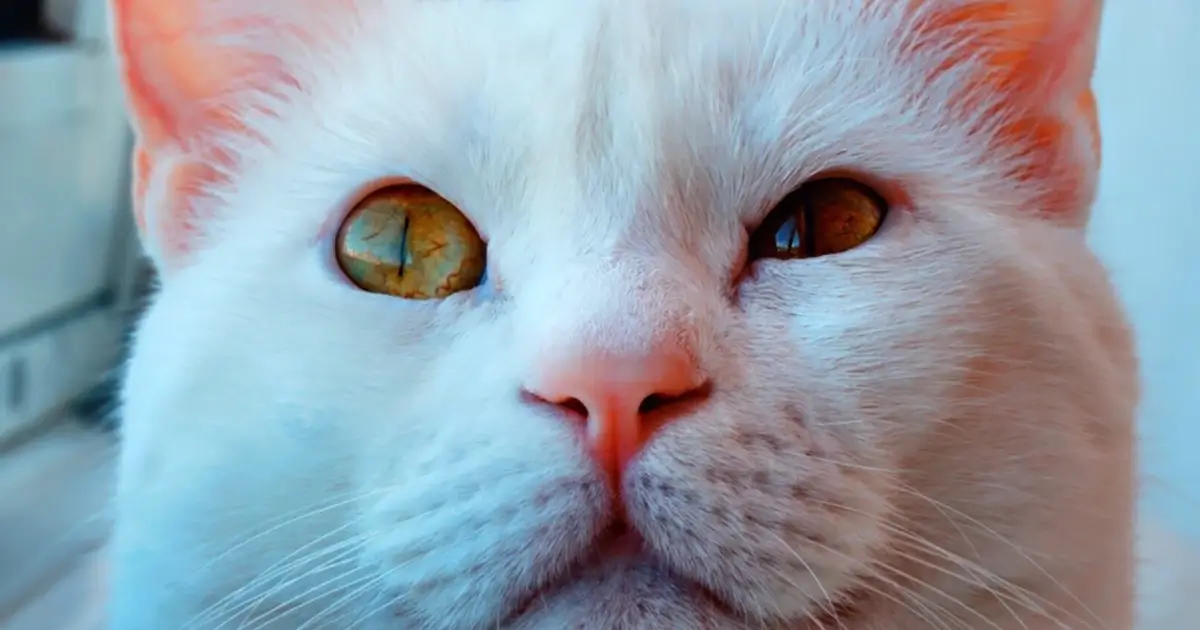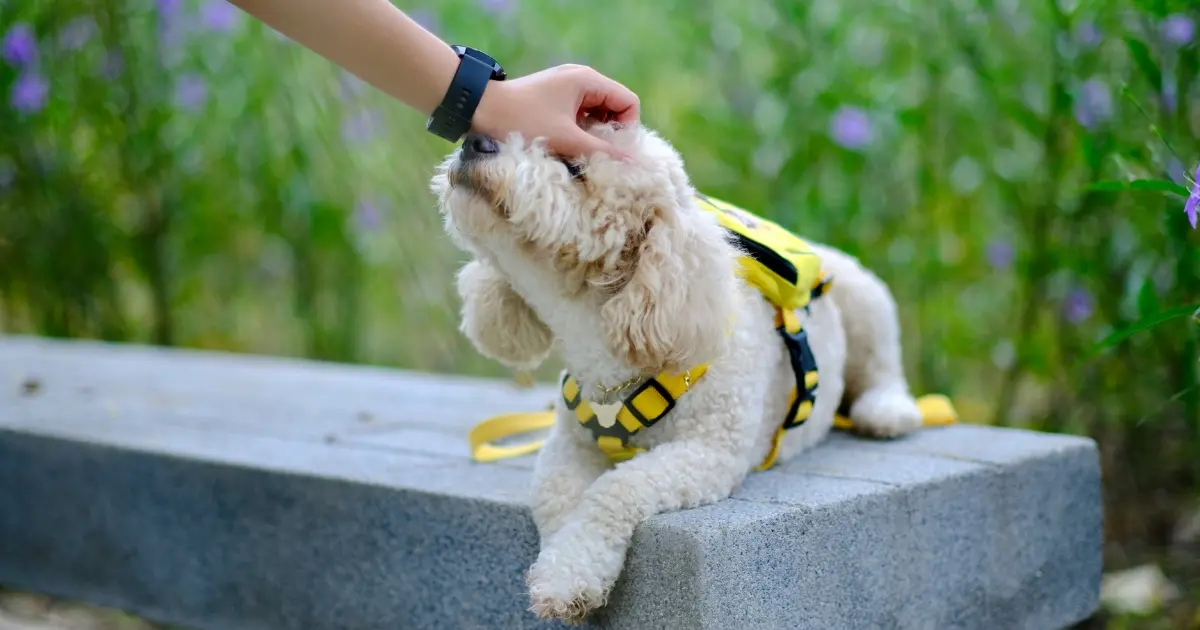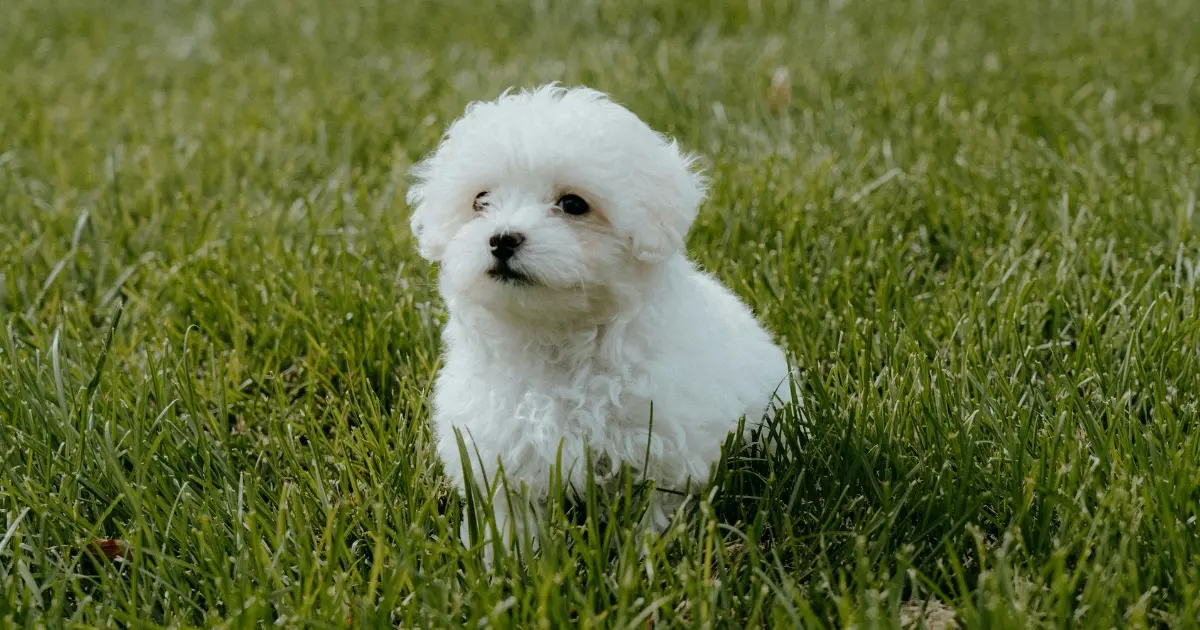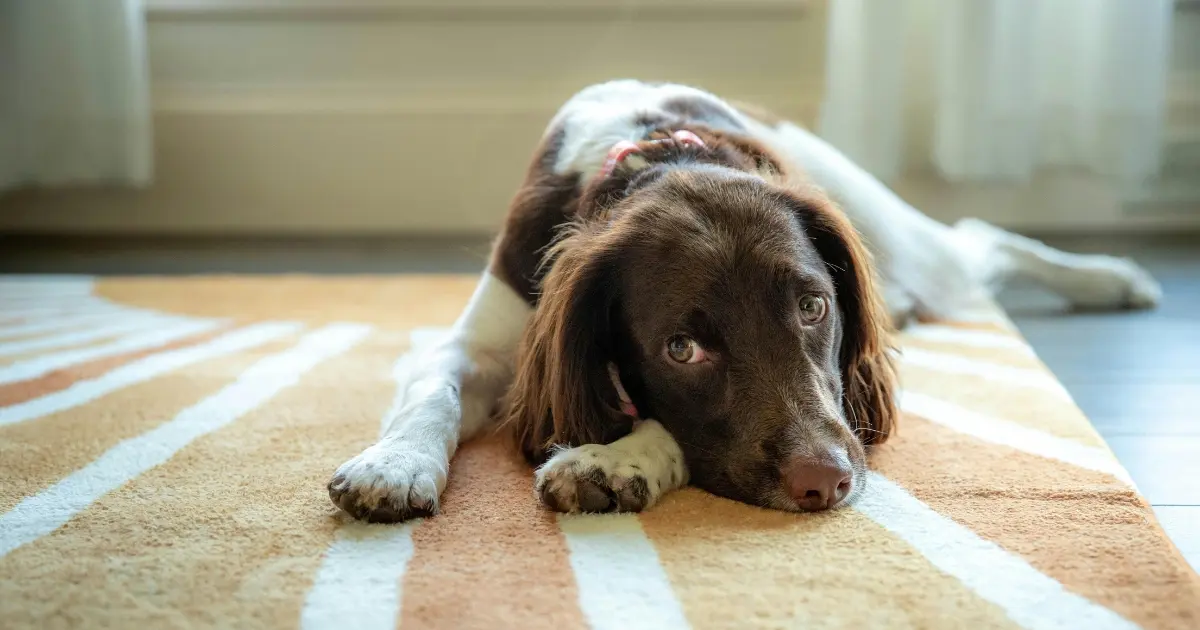Finding your dog’s urine on your bed can be frustrating and confusing. Many pet owners ask, “Why do dogs pee in your bed?” This unexpected behavior can stem from various medical, emotional, and behavioral issues that require understanding and patience.
Pet parents often wonder why their beloved companion would choose their bed as a bathroom. The reasons behind why a dog pees on your bed are complex. They can range from medical conditions to emotional stress. Understanding these triggers is the first step in addressing and preventing this unwelcome behavior.
In this comprehensive guide, we’ll explore the root causes of why dogs pee on your bed. We’ll also provide practical solutions to help you and your furry friend overcome this challenging situation. From medical concerns to training techniques, we’ll cover everything you need to know to restore peace and cleanliness to your home.
Table of Contents
Understanding Normal vs. Problematic Dog Urination Behaviors
Dog owners often wonder why their furry friends might pee on their bed. Knowing the difference between normal and problematic urination helps address issues fast and well.
Recognizing Normal Urination Patterns
Healthy dogs usually have set bathroom habits. Adult dogs pee 3-5 times a day. Puppies need more breaks because their bladders are smaller. Normal patterns include:
- Consistent timing after meals
- Urinating during walks
- Controlled bladder during indoor activities
- No accidental dog peeing on bed
When Dog Peeing Becomes a Problem
Not all dog peeing is normal. Signs of trouble include:
- Frequent urination inside the house
- Unexplained pee poo bed incidents
- Excessive drinking
- Visible discomfort while urinating
“Unusual urination can be a sign of underlying health concerns that require immediate attention.” – Veterinary Experts
Impact on Home and Health
When a dog pees the bed often, it messes with home cleanliness and the pet’s health. Repeated peeing might mean a medical issue or stress that needs a vet’s check.
Spotting why your puppy pees on your bed early can stop long-term health and behavior problems.
Why Do Dogs Pee in Your Bed? Common Triggers Explained
It can be puzzling when a puppy pees when you pet him or why dogs pee on your bed. Dogs pee in unexpected places for many reasons. These reasons are not just simple misbehavior.
Several key triggers can cause this uncomfortable situation:
- Emotional stress and anxiety
- Territorial marking behaviors
- Medical complications
- Lack of proper house training
When a dog pees in your bed, it might signal deeper psychological or physical issues. Anxiety can trigger unexpected urination. This happens when dogs feel overwhelmed or insecure in their environment.
“Dogs communicate through behavior, and inappropriate urination is often a cry for help or attention.” – Veterinary Behavior Specialist
Territorial marking is another reason dogs might pee on beds. Male and female dogs use urine to mark their space. This instinctive behavior can explain why dogs pee in your bed, especially in multi-pet households.
To stop door pee on the floor or bed accidents, pet owners must first find the root cause. Professional training, consistent routines, and medical checkups can help solve these problems.
Medical Conditions That Cause Bed Wetting in Dogs
When your dog pees on your bed, it’s not always a behavioral issue. Several medical conditions can trigger unexpected urination. This leaves pet owners puzzled about why their furry friend is having accidents.
Urinary Tract Infections and Bladder Issues
Urinary tract infections (UTIs) are a common reason why dogs might pee in unexpected places. These painful conditions can cause your dog to lose bladder control. This leads to accidents like peeing in sleep or on your bed.
- Frequent urination
- Blood in urine
- Discomfort while urinating
- Sudden urgency to pee
Age-Related Incontinence
Older dogs often struggle with bladder control. Dog pees in sleep scenarios become more frequent as pets age. Weakened muscle control contributes to unexpected bed-wetting incidents.
“Age doesn’t define a dog’s spirit, but it can impact their physical abilities.” – Veterinary Experts
Hormonal Imbalances
Hormonal changes can significantly impact your dog’s urinary habits. These imbalances might explain why your dog would pee on your bed. Especially if traditional training methods haven’t solved the problem.
- Reduced hormone levels
- Kidney function changes
- Neurological impacts
If you’re consistently experiencing issues like “my dog peed on my bed”, consulting a veterinarian is crucial. They can rule out these medical conditions and develop an appropriate treatment plan.
Behavioral and Emotional Reasons for Bed Peeing
Why a dog pees in their bed is more than just health issues. Emotional and behavioral factors are key to this problem.
Dogs pee in their beds for many reasons. These include:
- Separation anxiety
- Emotional stress
- Attention-seeking behaviors
- Past traumatic experiences
When an old dog pees in the house, it often shows deeper emotional issues. Anxiety can make dogs lose bladder control, especially when they’re sleeping or in familiar places like beds.
“A dog’s emotional state directly impacts their physical responses, including urination patterns.” – Veterinary Behavioral Specialist
Dogs might pee on my bed to show distress or seek comfort. This is common in dogs facing:
- Major life changes
- New family members or pets
- Changes in household routines
- Feeling threatened in their social hierarchy
Knowing these emotional triggers is key to stopping unwanted urination behaviors.
Territory Marking vs. Anxiety-Induced Urination
Dog owners often face the challenge of unexpected urination. This can be frustrating and confusing. It’s important to understand the psychological and emotional reasons behind it.
Dogs use urination to communicate. When a dog pees on furniture, it might be more than just an accident. It could be a sign of something deeper.
Understanding Territorial Behavior
Territorial marking is a natural behavior in dogs. It has several key characteristics:
- Small amounts of urine in specific locations
- Targeting areas with strong human or animal scents
- Deliberate positioning during urination
Anxiety and Stress Signals
Dogs can’t always tell us how they feel. They might pee to communicate. Anxiety-induced urination happens when dogs feel overwhelmed, anxious, or threatened.
- Overwhelmed by environmental changes
- Experiencing separation anxiety
- Feeling threatened or insecure
Social Dynamics in Multi-Pet Households
In homes with multiple pets, social hierarchy is important. Dominant dogs might pee on beds to mark their territory and show status.
“Understanding your dog’s unique communication style is key to preventing unwanted urination behaviors.”
If your dog pees on your bed, it’s important to figure out why. It could be due to territorial instincts or anxiety. Some dogs pee in their sleep due to medical issues. Always consult a vet.
Effective Training Methods to Stop Bed Peeing
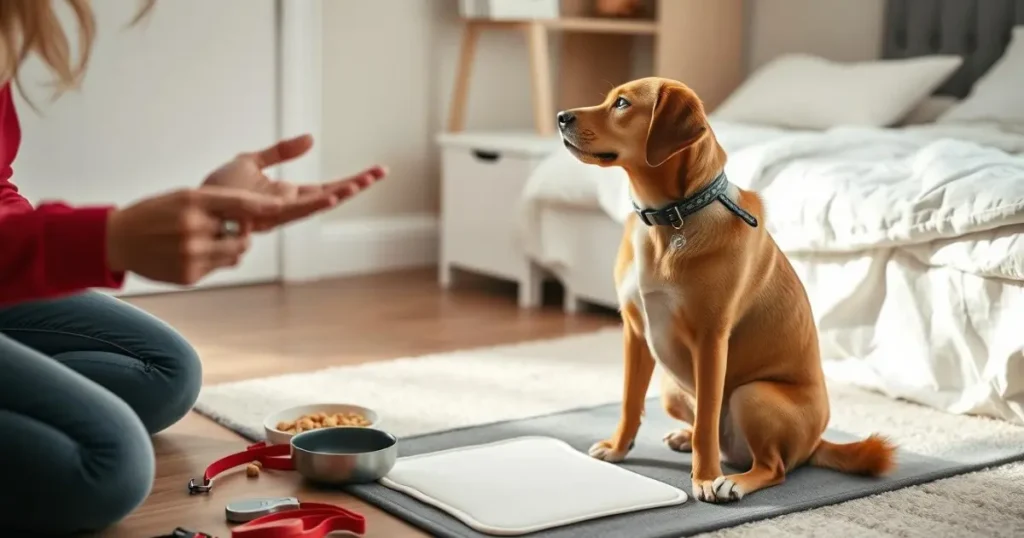
Training your dog to stop peeing in the bedroom needs patience and consistent strategies. It doesn’t matter if it’s a female dog peeing in sleep or a dog wetting bed but not urine. Understanding the reasons behind it is key.
Begin with a detailed plan to tackle dog peeing in bedroom behaviors:
- Establish a strict bathroom schedule
- Use positive reinforcement techniques
- Create designated sleeping areas
- Implement crate training
Positive reinforcement is the most effective method when your dog pees on dog bed. Reward your pet right after they go outside. Consistency is key in breaking unwanted urination patterns.
“Training takes time. Stay patient and persistent with your furry friend.” – Professional Dog Trainer
For dogs who pee in their sleep, try these specific strategies:
- Rule out medical issues with a veterinarian checkup
- Limit water intake before bedtime
- Use waterproof mattress protectors
- Practice nighttime potty breaks
Remember, every dog is different. What works for one might not work for another. Tailoring your approach to your pet’s specific needs will yield the best results in preventing bedroom accidents.
Creating a Comfortable Environment for Your Dog
Understanding why your dog pees on your bed is more than just a symptom. A supportive environment can greatly reduce unwanted urination. It helps your furry friend feel secure and comfortable.
Dogs pee on beds for many reasons like anxiety, territorial instincts, or not being trained well. By using smart strategies, you can cut down on these incidents.
Establishing a Safe Space
A dedicated area for your dog can reduce stress and prevent bed-wetting. Here are some tips:
- Provide a comfortable dog bed in a quiet corner
- Use calming pheromone diffusers
- Ensure consistent daily routines
Managing Access to Bedrooms
When your dog keeps peeing on your bed, controlling bedroom access is key. Here are some practical steps:
- Close bedroom doors when unsupervised
- Use baby gates to restrict bedroom entry
- Gradually reintroduce bedroom privileges after successful training
Setting Up a Proper Bathroom Schedule
Regular bathroom breaks are key to preventing dog pee on your bed. Create a reliable routine:
- Take your dog out immediately after waking
- Schedule regular bathroom breaks every 3-4 hours
- Reward successful outdoor bathroom trips
“A structured environment helps dogs feel secure and reduces inappropriate elimination behaviors.” – Veterinary Behaviorist
By following these steps, you’ll create a supportive environment. This will reduce bed-wetting incidents and strengthen your bond with your dog.
Cleaning Solutions and Prevention Strategies
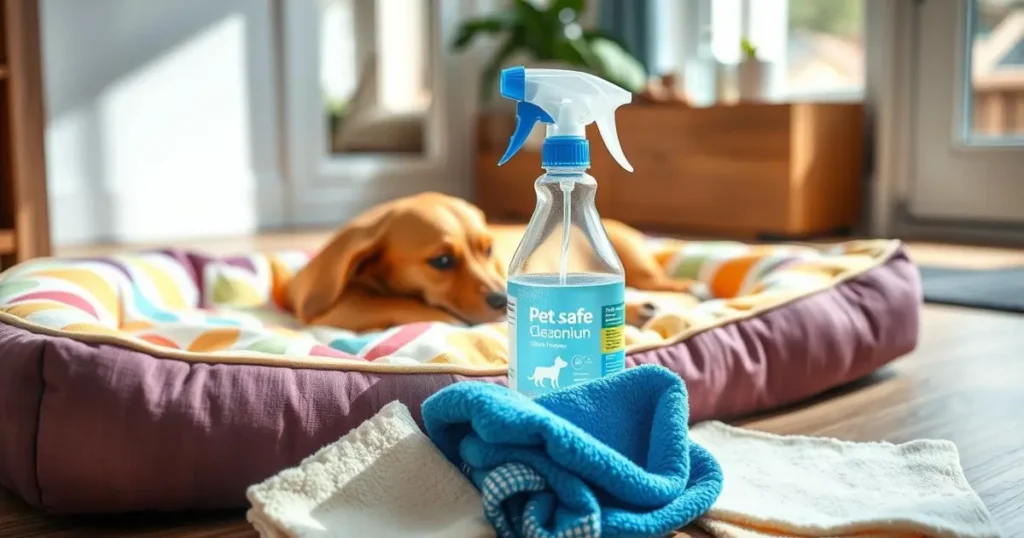
Dealing with dog pee on your mattress or bedding can be frustrating. You might wonder why your dog peed on you or had accidents while sleeping. Quick and effective cleaning is key.
First, find out why your dog peed unexpectedly. Dogs pee in odd places for many reasons, like health issues or anxiety. Acting fast is important to avoid stains and smells.
- Use enzymatic cleaners specifically designed for dog urine
- Blot – never rub – the affected area
- Remove bedding and wash in hot water
- Use white vinegar for natural odor neutralization
For mattress protection, think about using waterproof covers. These covers keep your mattress safe from dog pee. They make cleaning up easier and protect your mattress.
“Prevention is always better than cure when managing dog urination problems.” – Veterinary Behavioral Specialist
If your dog keeps peeing in her sleep or marking spots, see a vet. Health issues like urinary tract infections might be the cause. A vet can help figure out what’s wrong and treat it.
- Implement consistent bathroom schedules
- Reduce stress triggers
- Use positive reinforcement training
- Create comfortable sleeping environments
Regular cleaning, understanding your dog’s behavior, and addressing health issues can help a lot. This can reduce unexpected pee problems.
Conclusion
Figuring out why your dog pees on the bed takes patience and smart strategies. Dogs show us things through their actions, like peeing in wrong places. This can be due to health issues, feeling anxious, marking territory, or not knowing the right spot to pee.
It’s important to catch these signs early to avoid bigger problems later. A vet can check for health issues, and training can teach your dog to pee where it should. Being consistent and using positive rewards helps a lot.
Every dog is different, so finding the right solution is key. It depends on the dog’s personality, health, and surroundings. Getting help from a pro trainer or vet can make a big difference.
Dealing with bed-peeing issues requires understanding and action. With time, effort, and the right help, you can make your home happy again. Remember, your dog’s health and feelings matter a lot.
FAQ
Why is my dog suddenly peeing on my bed?
There are many reasons for this. It could be a medical issue, anxiety, or not being house-trained well. It might also mean your dog is stressed or trying to tell you something.
Is dog peeing on the bed a sign of a serious medical problem?
Yes, it could be. Problems like urinary tract infections or bladder stones need a vet’s check. Look out for signs like frequent peeing, blood in urine, or if your dog seems uncomfortable.
How can I stop my dog from peeing on the bed?
To stop this, try these steps: – Stick to a potty schedule – Keep the bedroom off-limits – Reward good behavior – Check for anxiety or health issues – Clean up accidents well to remove smells
Could my dog be peeing on the bed due to anxiety?
Yes, anxiety can cause this. Changes, new pets, or feeling left out can make your dog pee on the bed. It’s a way for them to feel safe or show stress.
How do I clean dog urine from my bed?
Use a pet urine cleaner to get rid of smells. Don’t use ammonia cleaners, as they can make the problem worse. Clean the mattress well and use a waterproof protector to prevent future accidents.
When should I see a vet about my dog’s bed-wetting?
See a vet if your dog pees a lot, has other symptoms, or it’s a new behavior. Also, if it happens while they’re sleeping or doesn’t stop with training.
Can older dogs develop incontinence that causes bed-wetting?
Yes, older dogs can get incontinence. It’s due to weak muscles, hormonal changes, or health issues. It’s common in older dogs, especially spayed females over 7 years old.
Is bed-wetting a sign of dominance?
Not really. While it’s a way for dogs to communicate, it’s not about showing dominance. It’s more likely due to stress, health issues, or not being trained well.
